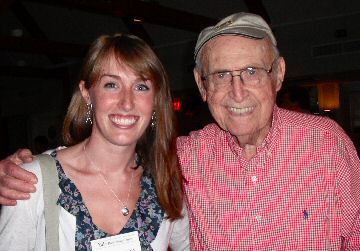Martin Levin and the Yale Publishing Course
Feature
Martin Levin Advice to Small Publishers
Book Publishing Great Leads Indies Through Changing Times
We’ve had a lot of great interviews in Independent Publisher over the years, but this man is in a category all his own. Martin Levin is best known as one of the greatest book publishing executives, having been senior vice president at Grosset & Dunlap, CEO of Times-Mirror Book Company and chairman of multiple publishing organizations…just to name a few accomplishments. He also received the Association of American Publishers’ highest lifetime achievement award (the Curtis Benjamin Award) in 1999. At 92 years old, Martin still practices law, teaches at New York Law School and consults with publishing companies.
After talking with Martin at the Yale Publishing Course, it was clear that he saw vast differences between the way that giant publishing companies and independent houses should operate in today’s unstable market. Instead of forging the path into digitization along side the Big Six, Martin suggests we indies sit back and relax.
“[Small houses] should sit on their hands. This market is too expensive and speculative now and the small publisher should watch and study. They are not able to make a substantial investment and wait two to three years to get their cash back.”
While this tactic seems passive, Martin makes a good point: independent houses rarely have the funds to start an app division or to convert an entire backlist (often with some rather obscure titles) into e-books. With so many variables to study – pricing, royalties, marketing, copyrights, and so forth – it is easier to let the big boys duke it out in the digital arena. It’s unlikely that small presses will turn the tide of the market this early in the game, so until these question marks have been resolved and models have been established, allow the big houses make the mistakes.

Martin and Jillian at the Yale Publishing Course
“Let the major publishers simplify and market apps,” Martin says. “E-books are easier to create but represent a threat to the publisher’s normal business because of the pricing structure. Smaller publishers should watch what the major publishers do in pricing and author compensation, then enter slowly after getting the best they can from their existing product. They are too vulnerable to bet the bank on an experimental area.”
We’re certainly not suggesting you forgo the digital world all together, but consider sticking with tried and true methods that work for your business. If your e-books are easy to convert and have an online market, by all means publish on Amazon to your heart’s content. For many small houses, however, laying off on the e-books is a necessity. Publishers that are known for their print works (e.g. pop-up books, certain cookbooks, specialty paper publishers, etc.) should not throw in the towel on print, especially if the e-book and app technology is not yet up to par.
“Print business will be a smaller part of the trade and probably more expensive,” Martin predicts, “but it will not be obsolete in the foreseeable future.” Martin points toward the so-called “paperback revolution” to illustrate his claim. Several decades ago, publishers were as worried about paperbacks as we are about e-books today. The thought was that the cheaper, smaller book would drive the hardcover to extinction (which we know was not the case). Just as the hardcover survived, so will the print book.
“While reduced in volume, paperbacks are still important,” Martin explains. “They are the least expensive form of entertainment and portable without the use of a device. Paperbacks will remain valuable.”
During one presentations at the YPC, Martin gave us great hope for the future. He explained that publishers have a permanent anchor in the market because we fulfill a need that won’t go away. For this reason, the publishing business, large and small houses alike, will never be a thing of the past.
“The educational structure makes reading a necessity,” Martin says. “Earning a living requires reading skills. Authors know this and write books at all levels. Small publishers can protect themselves by finding attractive authors that will in some mysterious way find an audience. The technological revolution is based on creating code, but the product it encodes is a manuscript.”
Don’t fear that we’ll lose the book among Angry Birds apps and 99 cent e-books, or that publishers will go the way of the dinosaur. We’re here to stay, and indies have the benefit of watching and learning as the times change.
* * * * *

Jillian Bergsma Manning is a contributing editor for Independent Publisher. She loves reading and writing but not arithmetic. Follow her on Twitter at @LillianJaine or on her blog at www.editorsays.com.

